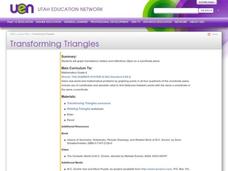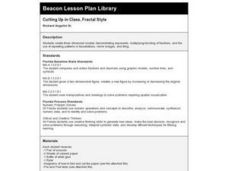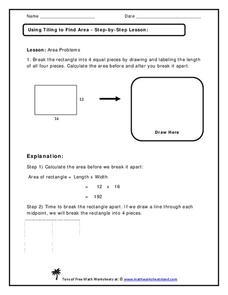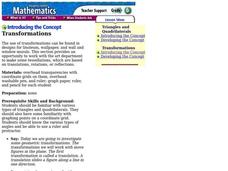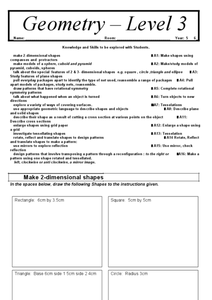Curated OER
Biology Tessellations
Pupils review three types of polygons that are triangles, squares, and hexagons. They use a computer program to draw various types of tessellations. The students use the drawing of a honeybee as inspiration.
Curated OER
Tiling with Pentominoes
In this tiling with pentominoes worksheet, 10th graders solve 3 different problems related to tiling with pentominoes. First, they define pentomino as a type of polygon and locate 10 other pentomino shapes in the figure shown at the top....
Curated OER
Let's Tesselate
Students investigate the geometrical concepts of translation, reflection, and rotation. They make different observations looking for the concepts that are displayed in classroom items like floor tiles, carpet designs, and visuals hung in...
Math Worksheets Land
Using Tiling to Find Area - Guided Lesson
By splitting a rectangle into equal parts, scholars can see area as well as calculate it. First, they determine the area of a rectangle given its side lengths. Then, they use the space provided to segment it into four equal parts,...
PBS
Frame Yourself: Area and Perimeter
Elementary schoolers are arranged in pairs and view the video Math Works: Measurement: The Difference Between Perimeter and Area. They discuss any prior knowledge they have of the term perimeter and then brainstorm together what the...
Curated OER
Free Printables: Handwriting 2
In this drawing learning exercise, students copy a number of shapes and then practice drawing the shape in the box provided at the bottom of the learning exercise.
Curated OER
Transforming Triangles
Sixth graders graph translations (slides) and reflections (flips) on a coordinate plane. They visualize and identify geometric shapes after applying transformations on a coordinate plane. Finally, 6th graders write a paragraph telling...
Curated OER
Cutting Up in Class, Fractal Style
Students create three-dimension models demonstrating exponents, multiplying and dividing of fractions, and the use of repeating patterns in tessellations, mirror images, and tiling.
Curated OER
Symmetry: Theory, Reality and Art!
Students explore the concept of geometric symmetry. In this geometric symmetry lesson, students walk around their school and take pictures of objects that demonstrate symmetry. Students use Microsoft Paint to draw the lines of symmetry...
Curated OER
Jenny Ten's Wallpaper
In this literacy activity, students create a unique design based upon the number ten. The directions even encourage the creation of a tessellation.
Wake Forest University
Authentic Activities for Connecting Mathematics to the Real World
Check out the handout from a presentation that contains a collection of high school algebra projects connecting a variety of mathematics to the real world. Activities range from simple probabilities to calculus. The activities...
Curated OER
Using Tiling to Find Area
There is only one area calculation problem here, and the explanation is detailed below; consider projecting this as an all-class warm up. Scholars assess a rectangle with given length and width, calculating its area. Next, they break it...
Curated OER
Visual Arts: Matisse and Escher
Third graders are introduced to the art of Henri Matisse and M.C. Escher. They create original works in the styles of Matisse and Escher and consider how their innovations have affected modern art.
Curated OER
Logo Licenses
Third graders find all the lines of reflection symmetry in a given shape, identify the order of rotational symmetry of a given shape. They create designs which have reflection symmetry, rotational symmetry (orders 2, 3, 4, 6) and...
Curated OER
Mandala Art
Students investigate art elements such as color schemes and proportion by creating their own personal Mandala Circle on paper or canvas. This also allows students to investigate mathematical concepts such as tesselations or social...
Curated OER
Transformations
Students draw on graph paper. In this geometry instructional activity, students review types of triangles and quadrilaterals. Students investigate geometric transformations, including translation, rotation and reflection. Students...
Curated OER
How Many Cells Are Born in a Day?
Learners predict the number of cells after a series of cell divisions. For this cells lesson students create a graph of their results and create a patterned drawing.
Virginia Department of Education
Rotation
Rotate this resource into your lesson plans. Scholars rotate polygons in the coordinate plane by multiples of 90 degrees. They then compare the original and new figures to develop conjectures about coordinate points after rotations.
Curated OER
Geometric Transformations
Learners examine images and preimages of a mapping and identify isometry. They view images by M.C. Escher, observe teacher demonstrations, and create a translation image, a rotation image, and a dilation.
Curated OER
Performing Transformations
Students investigate the concepts relating to creating a tessellation. They include using pattern blocks in order to create interconnecting patterns. Students review translations, rotations, and reflections.
Curated OER
Making Kites
Pupils engage in the study of kites and focus upon the evaluation and designs invovled. They conduct research into the different types of designs and use the information in order to create unique project designs. The drawings are created...
Curated OER
Geometry Level 3
What a wonderful resource! Learners create two-dimensional shapes according to the instructions stated, use the squares to make a triangular prism, a cube, and a pyramid, and identify features of plane shapes, among a myriad of other...
Mathed Up!
Congruent Shapes
Are congruent shapes compatible? Congruent shapes are identical to one another, and throughout the assessment, young mathematicians identify given shapes as congruent.
Bowland
Design the Mascot
Explore how resizing an object affects its area. The set of lessons challenges young mathematicians to design a mascot for electronic devices. These designs undergo resizing to determine how scale factors of dilation affect area.








